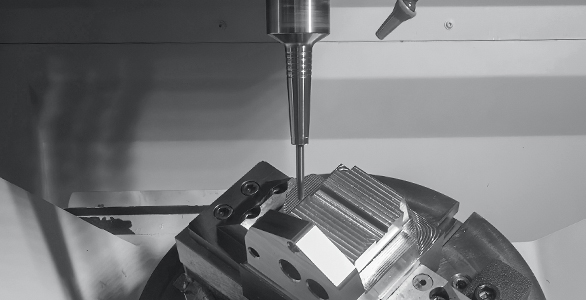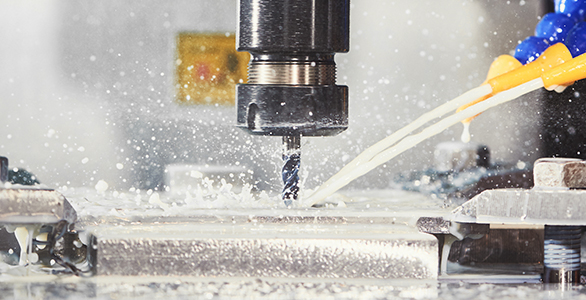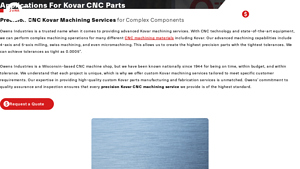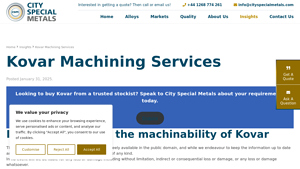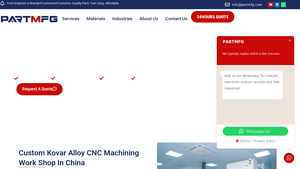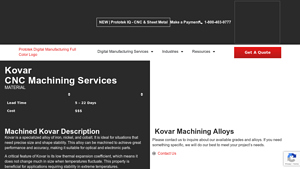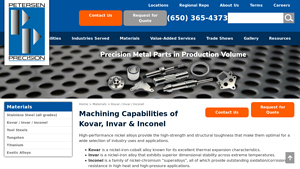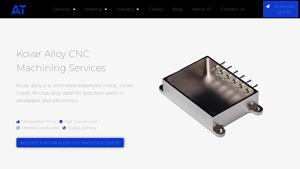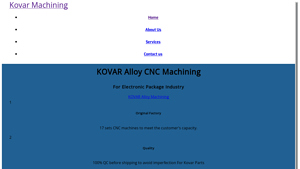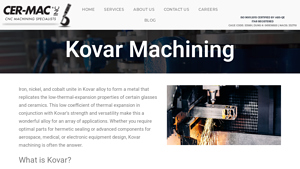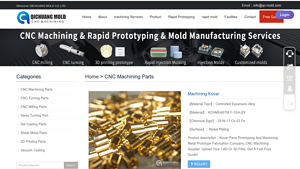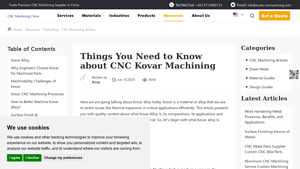Kovar Machining Services Guide: Type,Cost,Material…
Introduction: Navigating the Global Market for kovar machining services
In today’s competitive landscape, sourcing reliable Kovar machining services can be a daunting challenge for international B2B buyers, particularly those operating in regions such as Africa, South America, the Middle East, and Europe. Kovar, an iron-nickel-cobalt alloy renowned for its low thermal expansion and excellent machinability, is critical for high-precision applications across diverse industries, including aerospace, medical, and electronics. However, navigating the complexities of supplier selection, production capabilities, and cost considerations can significantly impact your project’s success.
This comprehensive guide aims to demystify the global market for Kovar machining services. Within these pages, you will find in-depth insights on various machining techniques, the specific applications of Kovar components, and essential criteria for vetting potential suppliers. We will also explore cost factors and strategies to ensure you obtain the best value for your investment.
By leveraging the knowledge provided in this guide, B2B buyers will be empowered to make informed purchasing decisions, ensuring that they choose the right partners for their Kovar machining needs. Whether you’re in Nigeria, Saudi Arabia, or any other market, this resource is designed to streamline your procurement process, enhance operational efficiency, and ultimately drive your business forward.
Understanding kovar machining services Types and Variations
| Type Name | Key Distinguishing Features | Primary B2B Applications | Brief Pros & Cons for Buyers |
|---|---|---|---|
| 4-Axis CNC Machining | Enhanced flexibility with rotational axes for complex geometries | Aerospace, Medical, Automotive | Pros: Precision in complex designs; Cons: Higher costs due to advanced technology. |
| 5-Axis CNC Machining | Allows for intricate shapes and multi-sided machining in a single setup | Aerospace components, Scientific instruments | Pros: Reduces setup time; Cons: Requires skilled operators. |
| Swiss Machining | Ideal for small, high-precision parts with tight tolerances | Electronics, Medical devices | Pros: Excellent for small batch production; Cons: Limited to specific part sizes. |
| Micromachining | Capable of producing extremely small and intricate parts | Optical components, Medical implants | Pros: High precision for tiny components; Cons: Specialized equipment needed. |
| EDM Services | Utilizes electrical discharge to create complex shapes with high precision | Aerospace, Defense, Medical | Pros: Great for hard materials; Cons: Slower than traditional machining methods. |
What Are the Key Characteristics of 4-Axis CNC Machining Services?
4-axis CNC machining enhances traditional 3-axis machining by adding a rotational axis, allowing for more complex geometries and intricate designs. This type of machining is particularly beneficial for industries such as aerospace and medical, where precision and complexity are critical. Buyers should consider their specific design requirements and the potential for increased costs associated with the advanced technology used in 4-axis machining.
How Does 5-Axis CNC Machining Differ from Other Types?
5-axis CNC machining offers the ability to manipulate tools along five different axes, enabling the creation of highly complex shapes in a single setup. This capability is especially valuable in aerospace and scientific applications, where precise, multi-faceted components are necessary. While it streamlines production and reduces setup times, buyers must ensure they have access to skilled operators who can manage the intricacies of this advanced machining process.
Why Choose Swiss Machining for Precision Parts?
Swiss machining is ideal for creating small, high-precision components, making it the go-to choice for industries like electronics and medical devices. This method excels in producing parts with tight tolerances and is particularly suited for small batch production. However, buyers should note that Swiss machining is limited to specific part sizes, which may impact their overall production capabilities.
What is Micromachining and Its Applications?
Micromachining specializes in producing extremely small and intricate parts, often used in optical components and medical implants. This technique allows manufacturers to achieve high precision in tiny components, which is essential in applications where space and accuracy are paramount. However, the need for specialized equipment can increase costs, making it crucial for buyers to evaluate their specific needs against the investment required.
How Does Electrical Discharge Machining (EDM) Work?
EDM services utilize electrical discharge to remove material and create complex shapes, making it an excellent choice for hard materials often found in aerospace and defense applications. This method provides high precision and is particularly effective for intricate designs. However, buyers should be aware that EDM can be slower than traditional machining methods, which may affect production timelines. Understanding these trade-offs is essential for making informed purchasing decisions.
Key Industrial Applications of kovar machining services
| Industry/Sector | Specific Application of Kovar Machining Services | Value/Benefit for the Business | Key Sourcing Considerations for this Application |
|---|---|---|---|
| Aerospace | High-precision spacecraft components | Ensures reliability and performance in extreme conditions | Look for suppliers with aerospace certifications and experience in tight tolerances. |
| Medical | Implantable devices and surgical instruments | Enhances patient safety and device longevity | Verify compliance with medical standards and quality assurance processes. |
| Electronics | Hermetic packages and hybrid circuits | Protects sensitive components from environmental damage | Assess the supplier’s capability to produce complex geometries and maintain strict tolerances. |
| Oil & Gas | Components for downhole tools and equipment | Increases operational efficiency and reliability in harsh environments | Evaluate the supplier’s experience with corrosion-resistant materials and high-stress applications. |
| Optics | Optical components such as lenses and mirrors | Provides high precision and durability for critical applications | Ensure the supplier has expertise in machining intricate designs and optical-grade finishes. |
How Are Kovar Machining Services Used in Aerospace Applications?
Kovar machining services play a vital role in manufacturing high-precision components for the aerospace industry. These parts, such as those used in spacecraft navigation systems, require exceptional dimensional accuracy and stability across varying temperatures. Kovar’s low coefficient of thermal expansion (CTE) makes it ideal for applications where thermal cycling occurs. Buyers in this sector should prioritize suppliers with aerospace certifications and proven experience in meeting stringent industry standards.
What Role Does Kovar Play in Medical Device Manufacturing?
In the medical field, Kovar is extensively used for creating implantable devices and surgical instruments. The material’s biocompatibility and corrosion resistance are crucial for ensuring patient safety and device longevity. Machining services must adhere to rigorous medical standards, which necessitates a supplier’s commitment to quality assurance and traceability. International buyers should verify that their suppliers have the necessary certifications and quality control measures in place.
How Does Kovar Enhance Electronics Manufacturing?
Kovar is indispensable in the electronics sector, particularly for hermetic packaging and hybrid circuits. Its unique properties protect sensitive electronic components from moisture and other environmental factors, thereby enhancing reliability and performance. Buyers should consider suppliers who can produce complex geometries and maintain tight tolerances, as these factors are critical in ensuring the functionality and longevity of electronic devices.
Why is Kovar Important for the Oil & Gas Industry?
In the oil and gas sector, Kovar is utilized for components in downhole tools and equipment, where durability and resistance to harsh environments are paramount. The machining of Kovar parts helps increase operational efficiency and reliability, which is vital for minimizing downtime. Buyers should assess suppliers based on their experience with corrosion-resistant materials and their ability to handle high-stress applications effectively.
What Benefits Does Kovar Provide in Optics Manufacturing?
Kovar machining services are essential for producing optical components like lenses and mirrors, where precision and durability are critical. The material’s stability under temperature fluctuations ensures that optical systems maintain their performance over time. Buyers in the optics sector should ensure that their suppliers have expertise in machining intricate designs and can achieve optical-grade finishes, which are crucial for successful optical applications.
3 Common User Pain Points for ‘kovar machining services’ & Their Solutions
Scenario 1: Difficulty in Achieving Tight Tolerances
The Problem: Many B2B buyers, particularly in high-tech industries such as aerospace and medical, face the challenge of needing Kovar components with extremely tight tolerances—often as stringent as 0.0005 inches. The complexity of these parts can lead to significant concerns about whether the machining service provider can meet these specifications. Inadequate precision can result in costly rework, delays, and failure to comply with industry standards, ultimately jeopardizing project timelines and budgets.
The Solution: To ensure that you select a machining service capable of delivering the required precision, it is crucial to conduct thorough due diligence. Look for service providers that specialize in Kovar machining and have a proven track record of achieving ultra-tight tolerances. Request detailed documentation of their machining capabilities, including examples of previous projects that demonstrate their precision. Additionally, inquire about the technology they utilize—services that employ advanced CNC machining techniques, such as 5-axis milling and micromachining, are more likely to achieve the desired results. Establishing clear communication with the machining service about your specifications and tolerances can facilitate better outcomes and reduce the risk of errors.
Scenario 2: Inconsistent Quality Across Orders
The Problem: Buyers often encounter inconsistencies in the quality of Kovar parts when ordering from different batches or suppliers. This inconsistency can stem from variations in machining processes, material quality, or even the skill level of the operators involved. Such fluctuations can have serious implications for industries like defense or medical, where reliability and uniformity are paramount.
The Solution: To combat this issue, it’s vital to partner with a machining service that prioritizes quality assurance throughout the manufacturing process. Look for companies that implement stringent quality control measures, such as ISO certification or regular audits of their machining processes. Additionally, consider establishing a long-term partnership with a single supplier to foster consistency in production. By collaborating closely with your chosen provider, you can develop tailored quality standards and even participate in the inspection processes. Regular communication and feedback can help ensure that each batch meets your quality requirements, thereby minimizing the risk of discrepancies.
Scenario 3: High Production Costs and Lead Times
The Problem: B2B buyers often face pressures related to high production costs and long lead times when sourcing Kovar components. This challenge is particularly pronounced for companies operating in fast-paced sectors where rapid prototyping and production are essential. Lengthy lead times can hinder innovation and delay product launches, while inflated costs can erode profit margins.
The Solution: To mitigate these challenges, consider streamlining your supply chain by exploring strategic partnerships with machining service providers that offer competitive pricing and quick turnaround times. Look for suppliers that utilize efficient machining processes and advanced technologies, which can significantly reduce production costs. Furthermore, discuss your production timelines upfront and ask about their capacity for rapid prototyping or batch production. Implementing lean manufacturing principles can also be beneficial; by working closely with your supplier to eliminate waste and optimize processes, you can achieve shorter lead times and more manageable costs. Regularly review your supplier’s performance and remain open to adjustments in your partnership to ensure that both parties can adapt to changing demands in the marketplace.
Strategic Material Selection Guide for kovar machining services
What Are the Key Properties of Kovar for Machining Services?
Kovar, an iron-nickel-cobalt alloy, is known for its unique properties that make it suitable for various high-precision applications. One of its most significant characteristics is its low coefficient of thermal expansion (CTE), which is similar to that of glass. This property is crucial for applications requiring hermetic seals, such as in electronic packaging and microwave tubes, where dimensional stability is vital under temperature fluctuations. Kovar also exhibits good machinability, weldability, and corrosion resistance, making it versatile for different manufacturing processes.
What Are the Pros and Cons of Using Kovar in Machining?
The advantages of Kovar include its excellent thermal stability and compatibility with glass, which is essential for creating reliable seals. Its durability and resistance to corrosion enhance the longevity of components, especially in harsh environments like aerospace and medical applications. However, Kovar can be more expensive than other materials, and its machining complexity requires specialized tooling and techniques, which may increase manufacturing costs. Additionally, the need for precision in machining Kovar can lead to longer lead times.
How Does Kovar Impact Specific Applications?
Kovar is particularly effective in applications that involve electronic components, such as hybrid circuits and hermetic packages. Its properties allow it to maintain structural integrity in high-pressure environments and extreme temperatures, making it suitable for aerospace and military applications. However, international buyers must consider specific media compatibility; for example, Kovar may not be ideal for environments with high sulfur content, which can lead to corrosion and material degradation.
What Should International B2B Buyers Consider When Selecting Kovar?
For international buyers, particularly from Africa, South America, the Middle East, and Europe, compliance with regional standards is crucial. Buyers should be aware of common standards such as ASTM, DIN, and JIS, which govern material specifications and quality assurance. Additionally, understanding local market preferences and regulations can aid in selecting the right suppliers and ensuring that the products meet the necessary certifications. Logistics and supply chain considerations are also important, as sourcing Kovar from different regions can impact lead times and costs.
Summary Table of Material Selection for Kovar Machining Services
| Material | Typical Use Case for kovar machining services | Key Advantage | Key Disadvantage/Limitation | Relative Cost (Low/Med/High) |
|---|---|---|---|---|
| Kovar | Electronic packaging, hermetic seals, aerospace components | Low thermal expansion, good machinability | Higher cost, complex machining | High |
| Stainless Steel | Medical devices, automotive components | Corrosion resistance, durability | Higher weight, lower thermal stability | Medium |
| Aluminum | Lightweight structures, heat exchangers | Low density, good thermal conductivity | Lower strength, less durable | Low |
| Inconel | High-temperature applications, oil and gas | Excellent heat resistance, corrosion resistance | High cost, difficult to machine | High |
This analysis provides a comprehensive overview of Kovar and other materials relevant to machining services, equipping international B2B buyers with the insights needed to make informed decisions.
In-depth Look: Manufacturing Processes and Quality Assurance for kovar machining services
What Are the Typical Manufacturing Processes for Kovar Machining Services?
The manufacturing of Kovar components involves several critical stages, each designed to ensure that the final product meets the stringent requirements of various industries. Understanding these processes is essential for B2B buyers looking for reliable machining services.
How Is Material Prepared for Kovar Machining?
The first step in the Kovar machining process is material preparation. Kovar, an iron-nickel-cobalt alloy, is known for its low thermal expansion and excellent machinability. The preparation involves sourcing high-quality Kovar stock from reputable suppliers. Buyers should verify that the material meets specific standards, such as ASTM F15, which governs the composition and properties of Kovar.
Once sourced, the material undergoes cutting and shaping to achieve the desired dimensions. This can include processes such as sawing or shearing to create rough blanks. The importance of precise dimensions cannot be overstated, as deviations can lead to complications in later stages.
What Forming Techniques Are Commonly Used in Kovar Machining?
Forming techniques for Kovar machining typically include CNC milling, turning, and, in some cases, specialized processes like Swiss machining.
-
CNC Milling: This technique allows for high precision in creating complex geometries and tight tolerances, often achieving specifications as tight as 0.0005 inches. Advanced CNC machines can operate in 4-axis and 5-axis configurations, making it possible to machine intricate designs with minimal manual intervention.
-
Turning: CNC lathes are employed to produce cylindrical components. The use of carbide tools is common here, enabling higher cutting speeds and better surface finishes. The choice of cutting speed and feed rate is crucial to avoid overheating and to maintain the integrity of the Kovar material.
-
Swiss Machining: This method is particularly useful for small, intricate parts, allowing for precise machining with minimal material waste. The ability to hold tolerances in the range of 0.001 inches makes it ideal for applications in the aerospace and medical sectors.
How Is Assembly Managed in Kovar Machining Services?
While Kovar components often require minimal assembly, certain applications do necessitate joining multiple parts. Techniques like laser welding and soldering are commonly used. The choice of assembly method depends on the application and the specific requirements of the project.
For instance, laser welding is favored for its precision and ability to maintain the structural integrity of the Kovar material. Proper cleaning and preparation of surfaces are essential to ensure strong, reliable joints.
What Quality Assurance Measures Are Implemented in Kovar Machining Services?
Quality assurance (QA) is a vital component of Kovar machining services, ensuring that products meet both international and industry-specific standards. This includes adherence to ISO 9001, which outlines quality management systems, as well as other relevant certifications such as CE and API for specific industries.
What Are the Key Quality Control Checkpoints in Kovar Machining?
Quality control (QC) is typically implemented at various checkpoints throughout the manufacturing process:
-
Incoming Quality Control (IQC): This initial phase involves inspecting raw materials upon arrival. Verification includes checking material certifications, dimensions, and compliance with specifications.
-
In-Process Quality Control (IPQC): During the machining process, operators perform regular checks to ensure that components are being produced to the required specifications. This may involve monitoring tool wear, cutting speeds, and tolerances.
-
Final Quality Control (FQC): Once machining is complete, a thorough inspection is conducted. This often includes dimensional checks using coordinate measuring machines (CMM), visual inspections, and functional testing as required by the specific application.
What Testing Methods Are Commonly Used for Kovar Components?
Common testing methods for Kovar components include:
- Dimensional Inspection: Using calipers, micrometers, and CMMs to verify that components meet specified tolerances.
- Visual Inspection: Checking for surface defects, finishes, and overall appearance.
- Functional Testing: Conducted for components that must meet specific performance criteria, such as hermetic seals in electronic applications.
How Can B2B Buyers Verify Supplier Quality Control Practices?
For international B2B buyers, particularly those in regions like Africa, South America, the Middle East, and Europe, verifying a supplier’s quality control practices is crucial. Here are some actionable steps:
-
Request Documentation: Buyers should ask for quality assurance documentation, including ISO certifications, QA manuals, and inspection reports. This provides insight into the supplier’s commitment to quality.
-
Conduct Audits: Whenever possible, buyers should conduct on-site audits of the machining facility. This allows them to observe the manufacturing processes, equipment, and quality control measures firsthand.
-
Engage Third-Party Inspectors: Utilizing third-party inspection services can provide an unbiased assessment of the supplier’s quality processes and the final products.
What Are the Quality Control Nuances for International Buyers?
When dealing with international suppliers, B2B buyers should be aware of specific quality control nuances. Different regions may have varying standards and certifications, which can affect compatibility with local regulations. It is essential to ensure that the supplier’s certifications are recognized in the buyer’s home country.
Moreover, language barriers and cultural differences can impact communication regarding quality expectations. Establishing clear specifications and open lines of communication can mitigate misunderstandings.
In conclusion, understanding the manufacturing processes and quality assurance measures for Kovar machining services is crucial for international B2B buyers. By focusing on material preparation, forming techniques, assembly, and rigorous quality control protocols, buyers can ensure they partner with reliable suppliers capable of delivering high-quality Kovar components.
Practical Sourcing Guide: A Step-by-Step Checklist for ‘kovar machining services’
Introduction
Sourcing Kovar machining services requires a systematic approach to ensure that your specifications and quality standards are met. This guide provides a practical checklist for B2B buyers, particularly those operating in Africa, South America, the Middle East, and Europe, to streamline the procurement process and identify reliable suppliers.
Step 1: Define Your Technical Specifications
Clearly outline the technical requirements of your project, including dimensions, tolerances, and surface finishes. Kovar is known for its unique properties, such as low thermal expansion and good machinability, which make it ideal for specific applications. Ensuring precise specifications helps potential suppliers understand your needs and reduces the risk of miscommunication.
- Considerations:
- What are the specific dimensions and tolerances required?
- Are there any industry standards or certifications that need to be adhered to?
Step 2: Research Potential Suppliers
Conduct thorough research to identify potential suppliers that specialize in Kovar machining services. Look for companies with a proven track record in your industry, as they will be more familiar with the specific challenges and requirements of Kovar machining.
- Actions:
- Utilize online directories and industry forums to compile a list of suppliers.
- Check for industry certifications and customer reviews to gauge their reliability.
Step 3: Evaluate Supplier Capabilities
Before committing, assess the machining capabilities of each supplier. Confirm whether they have advanced CNC equipment, such as 4-axis or 5-axis machining, which is essential for producing complex components from Kovar.
- Questions to ask:
- What types of machining processes do they offer?
- Can they achieve the tolerances required for your components?
Step 4: Request Samples and Quotes
Engage with shortlisted suppliers by requesting samples of their work and detailed quotes. Samples allow you to evaluate the quality of their machining, while quotes provide insight into pricing and lead times.
- Focus Areas:
- Are the samples consistent with your specifications?
- How competitive are their pricing structures compared to other suppliers?
Step 5: Verify Quality Assurance Processes
Quality assurance is critical when working with precision materials like Kovar. Ensure that potential suppliers have robust quality control measures in place, including inspection protocols and certifications.
- Key Indicators:
- Do they employ third-party inspections?
- What quality certifications do they hold (e.g., ISO 9001)?
Step 6: Assess Communication and Support
Effective communication can significantly impact the success of your project. Evaluate how responsive and supportive the suppliers are during your interactions, as this will reflect their customer service standards.
- Considerations:
- How quickly do they respond to inquiries?
- Are they proactive in providing updates or addressing concerns?
Step 7: Finalize Contractual Terms
Once you have selected a supplier, carefully review and finalize the contractual terms. Ensure that all aspects, including pricing, delivery schedules, and warranty provisions, are clearly outlined to avoid future disputes.
- Important Clauses:
- What are the payment terms?
- Are there penalties for late delivery or quality failures?
By following this checklist, B2B buyers can make informed decisions when sourcing Kovar machining services, ultimately ensuring project success and operational efficiency.
Comprehensive Cost and Pricing Analysis for kovar machining services Sourcing
What Are the Key Cost Components for Kovar Machining Services?
When sourcing Kovar machining services, understanding the underlying cost structure is essential for B2B buyers. The primary cost components typically include:
-
Materials: Kovar, an alloy of nickel, iron, and cobalt, is relatively expensive compared to standard machining materials. The cost can fluctuate based on market demand and availability, impacting overall pricing.
-
Labor: Skilled labor is required for precision machining, particularly for complex components that Kovar is often used for. Labor costs can vary significantly based on geographical location and the expertise level of the machinists.
-
Manufacturing Overhead: This includes expenses related to facility maintenance, utilities, and administrative costs. High-quality machining services often come with higher overhead costs due to advanced technology and equipment employed.
-
Tooling: The cost of specialized tooling for Kovar machining can be substantial. Carbide tools are recommended for their durability, but they represent a higher initial investment. Tooling costs are also influenced by the complexity of the parts being manufactured.
-
Quality Control (QC): Ensuring that parts meet tight tolerances and specifications involves rigorous quality assurance processes. The costs associated with QC can be significant, especially for industries such as aerospace and medical, where compliance with strict regulations is mandatory.
-
Logistics: Shipping costs can vary based on the location of the supplier and the buyer. International shipping can introduce additional tariffs and duties, which should be considered in the total cost.
-
Margin: Suppliers typically add a markup to cover their costs and generate profit. Margins can vary widely based on market conditions, competition, and the supplier’s reputation for quality.
How Do Pricing Influencers Impact Kovar Machining Costs?
Several factors influence the pricing of Kovar machining services:
-
Volume/MOQ (Minimum Order Quantity): Larger orders often lead to reduced per-unit costs due to economies of scale. Buyers should negotiate for lower prices based on their order volumes.
-
Specifications and Customization: Custom parts that require unique designs or tighter tolerances may incur higher costs. Providing clear specifications upfront can help avoid unexpected price increases.
-
Material Quality and Certifications: Higher-quality materials or those with specific certifications (like ISO or AS9100 for aerospace) can result in increased prices. Buyers should assess the necessity of these certifications based on their applications.
-
Supplier Factors: The reputation, experience, and reliability of the supplier play a crucial role in pricing. Established suppliers may charge a premium for their expertise and proven track record.
-
Incoterms: The agreed terms for shipping can significantly affect costs. Understanding Incoterms (like FOB, CIF) is essential for calculating total landed costs.
What Tips Can Help Buyers Negotiate Better Prices for Kovar Machining Services?
B2B buyers, especially from regions like Africa, South America, the Middle East, and Europe, can benefit from the following strategies:
-
Negotiate Terms Upfront: Engage suppliers early in discussions to negotiate terms, pricing, and delivery schedules. This helps in aligning expectations and reducing misunderstandings later on.
-
Evaluate Total Cost of Ownership (TCO): Instead of focusing solely on upfront costs, consider the TCO, which includes maintenance, operational efficiency, and potential downtime costs. This broader perspective can highlight better long-term value.
-
Understand Pricing Nuances for International Transactions: Be aware of exchange rates, tariffs, and local market conditions that can affect costs. Establishing relationships with local suppliers may also mitigate some international logistics challenges.
-
Request Quotes from Multiple Suppliers: Gathering quotes allows buyers to compare pricing and services, ultimately leading to more informed decisions. It also provides leverage in negotiations.
Disclaimer on Indicative Prices
Prices for Kovar machining services can vary widely based on the aforementioned factors and are subject to change. Buyers should conduct thorough market research and engage directly with suppliers to obtain accurate and current pricing information tailored to their specific needs.
Alternatives Analysis: Comparing kovar machining services With Other Solutions
Exploring Alternatives to Kovar Machining Services
In the realm of precision component manufacturing, Kovar machining services are widely recognized for their unique properties, particularly in applications requiring hermetic sealing and thermal expansion compatibility with glass. However, there are other viable alternatives that B2B buyers may consider based on their specific requirements, such as cost, performance, and ease of implementation. Here, we will compare Kovar machining services with two alternative solutions: Ceramic Machining and Aluminum Machining.
Comparison Table
| Comparison Aspect | Kovar Machining Services | Ceramic Machining | Aluminum Machining |
|---|---|---|---|
| Performance | High precision, tight tolerances (up to 0.0005″) | Excellent wear resistance, high temperature stability | Good machinability, lightweight, versatile |
| Cost | Moderate to high | High due to material costs and complexity | Generally low to moderate |
| Ease of Implementation | Requires specialized equipment and skills | Complex processes and specialized tools needed | Widely accessible, easy to machine |
| Maintenance | Low maintenance, stable properties | Can be brittle, requires careful handling | Low maintenance, good durability |
| Best Use Case | Aerospace, medical, and electronic applications | High-performance components in extreme environments | General engineering, automotive, and consumer products |
Detailed Breakdown of Alternatives
Ceramic Machining
Ceramic machining involves the shaping and finishing of ceramic materials, which are known for their exceptional hardness and wear resistance. While ceramics can withstand high temperatures and offer excellent chemical resistance, the machining process can be complex and requires specialized tools. The cost of ceramic materials is typically higher than Kovar, making it less favorable for projects with tight budgets. Additionally, ceramics can be brittle, which necessitates careful handling during the manufacturing process to prevent breakage. This solution is best suited for applications that demand high wear resistance and temperature stability, such as aerospace components and cutting tools.
Aluminum Machining
Aluminum machining is a widely used process due to the material’s excellent machinability, lightweight nature, and cost-effectiveness. Aluminum components can be produced quickly and efficiently, making it a popular choice for many industries, including automotive and consumer goods. The ease of implementation is a significant advantage, as aluminum can be machined using standard equipment and techniques. However, while aluminum is versatile, it may not provide the same thermal expansion properties or hermetic sealing capabilities as Kovar, making it less suitable for applications in electronics or aerospace where precise thermal management is critical.
Conclusion: Making the Right Choice for Your Needs
When selecting a machining service, B2B buyers must consider their specific application requirements, including performance, cost, and ease of implementation. Kovar machining services excel in precision and thermal stability, making them ideal for high-performance applications. However, for projects with budget constraints or those that require rapid production, aluminum machining may be a more suitable alternative. Ceramic machining, while offering superior performance in extreme conditions, may not be feasible for all projects due to its higher costs and complexity. Ultimately, understanding the strengths and weaknesses of each option will empower buyers to make informed decisions that align with their operational goals.
Essential Technical Properties and Trade Terminology for kovar machining services
What Are the Key Technical Properties of Kovar Machining Services?
Kovar is a specialized alloy primarily composed of nickel, iron, and cobalt, known for its unique thermal expansion characteristics. Understanding its technical properties is essential for making informed decisions when sourcing Kovar machining services. Here are some critical specifications:
-
Material Grade
Kovar’s primary grade is characterized by a low coefficient of thermal expansion (CTE) similar to glass. This property is crucial for applications requiring hermetic seals, such as electronic packaging and microwave tubes. A consistent material grade ensures compatibility with other materials, particularly in sensitive environments. -
Tolerances
Precision machining often requires tight tolerances, with Kovar parts capable of achieving tolerances as tight as 0.0005 inches. Such precision is vital in industries like aerospace and medical devices, where even minor deviations can lead to significant failures. Understanding tolerance levels helps buyers specify their needs clearly to manufacturers. -
Density
Kovar has a density of approximately 8.36 g/cm³. This property affects the weight and thermal properties of the final product, which is crucial for applications in aerospace and military sectors where weight savings can lead to enhanced performance. -
Machinability
Kovar’s machinability is influenced by its alloy composition. It is typically machined using carbide tools for uninterrupted cuts, which allows for high cutting rates and reduces production time. Familiarity with machinability helps buyers select the right tooling and machining methods for their projects. -
Melting Point
The melting point of Kovar is around 1455°C, making it suitable for high-temperature applications. Knowing the melting point is essential for processes like welding and heat treatment, ensuring that the material maintains its integrity under various conditions. -
Corrosion Resistance
Kovar exhibits good corrosion resistance, which is vital for components exposed to harsh environments. This property is particularly important in industries such as oil and gas, where equipment is subjected to corrosive substances. Buyers should consider corrosion resistance when selecting materials for specific applications.
What Are Common Trade Terms Used in Kovar Machining Services?
Familiarity with industry jargon can enhance communication between buyers and suppliers. Here are some commonly used terms:
-
OEM (Original Equipment Manufacturer)
An OEM refers to a company that produces parts or equipment that may be marketed by another manufacturer. Understanding OEM relationships is vital for buyers seeking to source Kovar components that meet specific quality and design standards. -
MOQ (Minimum Order Quantity)
MOQ is the smallest quantity of a product that a supplier is willing to sell. Knowing the MOQ helps buyers plan their procurement strategies and manage inventory costs effectively. It’s essential for cost efficiency, especially in large-scale projects. -
RFQ (Request for Quotation)
An RFQ is a document that solicits price quotes from suppliers for specific products or services. It is a crucial step in the procurement process, allowing buyers to compare costs and services from different suppliers. A well-prepared RFQ can expedite the sourcing process. -
Incoterms (International Commercial Terms)
Incoterms define the responsibilities of buyers and sellers in international transactions, including shipping and delivery terms. Familiarity with these terms is essential for avoiding misunderstandings and ensuring smooth logistics when sourcing Kovar parts from global suppliers. -
Lead Time
Lead time refers to the amount of time it takes from placing an order to receiving the product. Understanding lead times is crucial for project planning and ensuring that components are available when needed, particularly in industries with strict timelines. -
CNC (Computer Numerical Control)
CNC refers to the automated control of machining tools using a computer. CNC machining services for Kovar allow for high precision and repeatability, making them essential for complex parts in various industries. Recognizing the value of CNC capabilities can guide buyers in selecting the right suppliers.
By grasping these technical properties and trade terminologies, B2B buyers can make more informed decisions when sourcing Kovar machining services, ultimately leading to improved project outcomes and stronger supplier relationships.
Navigating Market Dynamics and Sourcing Trends in the kovar machining services Sector
What Are the Key Trends Shaping the Kovar Machining Services Market?
The Kovar machining services sector is experiencing significant transformations driven by technological advancements and evolving market demands. A primary driver is the increasing reliance on precision components across industries such as aerospace, medical, and electronics. The adoption of advanced CNC machining technologies, including 5-axis machining and micromachining, enhances the capability to produce intricate designs with tight tolerances, often as precise as 0.0005 inches. This precision is crucial for applications such as hermetic seals and electronic packaging, which are essential in ensuring the reliability of critical components.
Emerging B2B tech trends also include automation and Industry 4.0 practices, which improve efficiency and reduce lead times. International B2B buyers, particularly from regions like Africa, South America, the Middle East, and Europe, are increasingly seeking suppliers who can provide rapid prototyping and just-in-time manufacturing to meet their dynamic needs. Moreover, the focus on digital platforms for sourcing is gaining traction, facilitating easier comparisons of service providers based on their capabilities and past performance.
Market dynamics are further influenced by geopolitical factors and supply chain considerations. Buyers must navigate fluctuating material costs and supply chain disruptions, emphasizing the need for reliable partners who can ensure continuity and quality in production. As global competition intensifies, companies offering value-added services, such as engineering support and tailored solutions, are well-positioned to capture market share.
How Is Sustainability and Ethical Sourcing Impacting Kovar Machining Services?
Sustainability and ethical sourcing have become critical considerations in the Kovar machining services market. As environmental regulations tighten globally, B2B buyers are increasingly prioritizing suppliers that demonstrate a commitment to sustainable practices. The production of Kovar, which involves nickel and cobalt, necessitates responsible sourcing to mitigate environmental impacts associated with mining and processing these materials.
Buyers are encouraged to seek suppliers who possess ‘green’ certifications and adhere to ethical supply chain standards. This includes ensuring that materials are sourced from responsible suppliers who minimize ecological footprints and uphold human rights. Implementing sustainable machining practices, such as using biodegradable cutting fluids and optimizing energy consumption, can further enhance a company’s appeal to environmentally-conscious clients.
The emphasis on sustainability is not just a regulatory requirement but also a significant differentiator in a competitive market. By aligning with suppliers that prioritize environmental stewardship, B2B buyers can strengthen their brand reputation and appeal to a growing segment of consumers who value sustainability. Additionally, companies that invest in sustainable practices often realize long-term cost savings through improved efficiency and waste reduction.
What Is the Historical Context of Kovar Machining Services?
The history of Kovar machining services can be traced back to the mid-20th century when Kovar was developed as a unique alloy designed for glass-to-metal seals. This innovation paved the way for its widespread adoption in critical applications, particularly in the aerospace and electronics sectors. Over the decades, advancements in machining technology have significantly enhanced the capabilities of manufacturers to produce Kovar components with unprecedented precision and complexity.
As industries evolved, the demand for high-performance materials like Kovar surged, leading to the establishment of specialized machining services. Today, Kovar is recognized for its low thermal expansion coefficient and excellent machinability, making it an essential choice for applications ranging from medical devices to optical systems. The continuous improvement of CNC machining techniques has further propelled the growth of the Kovar machining services sector, allowing manufacturers to meet the stringent requirements of modern engineering applications.
Frequently Asked Questions (FAQs) for B2B Buyers of kovar machining services
-
How do I choose the right Kovar machining supplier for my needs?
Choosing the right Kovar machining supplier involves several key steps. First, evaluate the supplier’s experience and expertise in machining Kovar, particularly in your specific application. Check for certifications that indicate quality assurance, such as ISO standards. Request samples of previous work to assess their precision and quality. Additionally, consider their production capabilities—such as CNC technology and machining techniques—and their ability to meet your deadlines and budget. Finally, gather feedback from other clients or industry references to ensure reliability and performance. -
What are the typical lead times for Kovar machining services?
Lead times for Kovar machining services can vary widely depending on the complexity of the parts, the supplier’s workload, and your order size. Generally, you can expect lead times ranging from 2 to 6 weeks. For custom or complex components, it may take longer. It’s essential to communicate your project timelines with the supplier upfront to ensure they can meet your deadlines. Also, inquire about their capacity for expedited services if you require faster turnaround times. -
What is the minimum order quantity (MOQ) for Kovar machining services?
Minimum order quantities for Kovar machining services can differ significantly among suppliers. Some may require a MOQ of several hundred pieces, while others may accommodate smaller orders, particularly for prototyping or low-volume projects. When sourcing suppliers, clarify their MOQ policies to ensure they align with your production needs. If you have specific volume requirements, discussing them directly with the supplier can often lead to flexible arrangements. -
What payment terms should I expect when sourcing Kovar machining services?
Payment terms for Kovar machining services typically vary by supplier and may include options such as upfront payments, net 30, or net 60 days. It’s crucial to discuss and agree upon payment terms before finalizing your order. Many suppliers may require a deposit for custom projects, especially for higher-value orders. Always ensure that the payment terms are documented in the contract to avoid misunderstandings later in the process. -
How can I ensure quality assurance in Kovar machining?
To ensure quality assurance in Kovar machining, choose a supplier that adheres to recognized quality standards, such as ISO 9001. Request details about their quality control processes, including inspection methods and testing protocols. Ask for certifications and documentation that demonstrate compliance with industry specifications. Additionally, consider implementing a third-party inspection if your order involves critical components, ensuring they meet the necessary tolerances and specifications before delivery. -
What customization options are available for Kovar machined parts?
Customization options for Kovar machined parts can include variations in size, shape, surface finish, and tolerance levels. Many suppliers offer tailored solutions based on your specific requirements, such as complex geometries or unique designs. Discuss your project specifications in detail with potential suppliers to explore available customization options. A good supplier will collaborate with you to provide solutions that meet your design and functional needs. -
What industries commonly use Kovar machined components?
Kovar machined components are widely utilized across various industries, including aerospace, military and defense, medical devices, optics, and electronics. Its unique properties, such as a low coefficient of thermal expansion and excellent machinability, make it ideal for applications requiring hermetic seals and precise tolerances. Understanding the industries your supplier specializes in can help ensure they have the relevant expertise to meet your specific requirements. -
What logistics considerations should I keep in mind when sourcing Kovar machining services internationally?
When sourcing Kovar machining services internationally, consider logistics factors such as shipping costs, customs duties, and delivery timelines. Ensure that your supplier can handle international shipping and is familiar with customs regulations in your country. It’s advisable to discuss shipping options, including express services for urgent deliveries, and to clarify who bears the shipping costs. Additionally, consider using a freight forwarder to facilitate smoother logistics and reduce potential delays in your supply chain.
Important Disclaimer & Terms of Use
⚠️ Important Disclaimer
The information provided in this guide, including content regarding manufacturers, technical specifications, and market analysis, is for informational and educational purposes only. It does not constitute professional procurement advice, financial advice, or legal advice.
While we have made every effort to ensure the accuracy and timeliness of the information, we are not responsible for any errors, omissions, or outdated information. Market conditions, company details, and technical standards are subject to change.
B2B buyers must conduct their own independent and thorough due diligence before making any purchasing decisions. This includes contacting suppliers directly, verifying certifications, requesting samples, and seeking professional consultation. The risk of relying on any information in this guide is borne solely by the reader.
Top 10 Kovar Machining Services Manufacturers & Suppliers List
1. Owens Industries – Kovar Precision CNC Machining
Domain: owensind.com
Registered: 1996 (29 years)
Introduction: Kovar Precision CNC Machining Services offered by Owens Industries, Inc. include advanced machining capabilities such as 4-axis and 5-axis milling, swiss machining, and micromachining. The company can achieve tolerances as tight as 0.0005″ and specializes in custom Kovar machining services tailored to specific customer requirements. Applications for Kovar CNC parts include electronic components (h…
2. City Special Metals – Kovar Properties Overview
Domain: cityspecialmetals.com
Registered: 2009 (16 years)
Introduction: Kovar Density: 8.26 g/cm³; Tensile Strength: 75 Ksi (518 MPa); Yield Strength: 40 Ksi (276 MPa); Elongation: 50.8 / 30%; Typical Hardness (annealed): Rockwell HRB 80; Curie Temperature: 435°C; Melting Range: 1449°C; Thermal Conductivity at 20°C: Not specified; Electrical Resistivity: 49 mm²/m; Modules of Elasticity at 20°C: 207 MPa.
3. Part MFG – Kovar Alloy CNC Machining
Domain: partmfg.com
Registered: 2024 (1 years)
Introduction: Kovar Alloy CNC Machining offers precision-engineered solutions for specialized applications due to its unique properties, such as low coefficient of thermal expansion and mechanical stability. Kovar is a nickel-cobalt alloy, typically composed of approximately 29% nickel, 17% cobalt, and 54% iron. It is commonly used in electronic packaging, aerospace components, sensors, telecommunications, and …
4. Prototek – Machined Kovar
Domain: prototek.com
Registered: 1996 (29 years)
Introduction: Machined Kovar is a specialized alloy of iron, nickel, and cobalt, ideal for applications requiring precise size and shape stability. It features a low thermal expansion coefficient, making it suitable for extreme temperature conditions. Key characteristics include excellent precision and performance, with applications in aerospace parts, diodes, electronic components, hermetic seals, medical devi…
5. Petersen Precision – High-Performance Nickel Alloys
Domain: petersenprecision.com
Registered: 1997 (28 years)
Introduction: Kovar, Invar, and Inconel are high-performance nickel alloys known for their strength and structural toughness. Kovar is a nickel-iron-cobalt alloy with excellent thermal expansion characteristics, suitable for applications like tube lighting and aerospace sensor applications. Invar is a nickel-iron alloy that provides superior dimensional stability, ideal for aerospace molds and magnetic shieldin…
6. At Machining – Kovar Alloy Solutions
Domain: at-machining.com
Registered: 2014 (11 years)
Introduction: Kovar alloy is a nickel-cobalt-iron alloy known for its controlled expansion characteristics, making it ideal for precision parts in aerospace and electronics. It consists of approximately 29% nickel, 17% cobalt, and the remainder iron, with trace elements to enhance performance. Kovar has a stable coefficient of thermal expansion over the -80°F to 450°F temperature range, good mechanical properti…
7. Kovar Machining – Precision CNC Solutions
Domain: kovar-machining.com
Registered: 2025 (0 years)
Introduction: Kovar Alloy CNC Machining for the electronic package industry. Specializes in Kovar and Invar alloy machining for hermetic packages. Utilizes 17 CNC machines to meet customer capacity. Offers 100% quality control before shipping to avoid imperfections. 17 years of experience in Kovar parts machining. Focus on avoiding defects such as flatness, appearance, burrs, parallelism, and cutting marks. Emp…
8. Cermac – Kovar Alloy
Domain: cermac.com
Registered: 1998 (27 years)
Introduction: Kovar is an alloy composed of 29% nickel, 17% cobalt, and 52+% iron, known for its low coefficient of thermal expansion, strength, and versatility. It is ideal for applications requiring hermetic sealing, particularly in aerospace, medical, and electronic equipment. Key benefits include good corrosion resistance, dependable mechanical properties, and versatility across various industries. Cer-Mac …
9. QC Mold – Custom Kovar Parts
Domain: qc-mold.com
Registered: 2017 (8 years)
Introduction: Product Name: Custom Kovar Parts
Material Type: Controlled Expansion Alloy
Material: KOVAR/ASTM F-15/4J29
Chemical Composition: 29 Ni-17 Co-53 Fe
Surface Finish: Nickel Plating
Description: Kovar alloy is a vacuum melted, iron-nickel-cobalt, low expansion alloy with controlled chemical composition for precise thermal expansion properties. Extensive quality controls ensure uniform physical and mech…
10. Tuofa – Kovar Alloy
Domain: tuofa-cncmachining.com
Registered: 2022 (3 years)
Introduction: Kovar Alloy: A Fe-Co-Ni alloy with a greyish silver color, manufactured in a vacuum with controlled chemical composition.
Composition:
– Iron (Fe): 54% (Base metal providing structural strength)
– Nickel (Ni): 29% (Controls thermal expansion to match glass/ceramics)
– Cobalt (Co): 17% (Enhances thermal stability and magnetic properties)
– Manganese (Mn): ≤0.50% (Improves machinability and de…
Strategic Sourcing Conclusion and Outlook for kovar machining services
In the competitive landscape of Kovar machining services, strategic sourcing is pivotal for international B2B buyers aiming to enhance their operational efficiency and product quality. Understanding the unique properties and applications of Kovar, alongside its machining requirements, is essential for selecting the right supplier. High-precision machining capabilities, such as 4-axis and 5-axis milling, as well as the use of advanced tooling materials, can significantly impact the performance and reliability of the components produced.
For businesses in Africa, South America, the Middle East, and Europe, leveraging a supplier with a proven track record in quality assurance and timely delivery can lead to substantial cost savings and reduced lead times. As industries such as aerospace, medical, and electronics increasingly demand complex Kovar components, aligning with a capable partner will be crucial for meeting market needs.
Looking ahead, international buyers should actively engage with reputable Kovar machining service providers to explore tailored solutions that meet their specific requirements. Now is the time to seize opportunities in this specialized market—connect with industry leaders and elevate your sourcing strategy to ensure your business remains at the forefront of innovation and quality.
